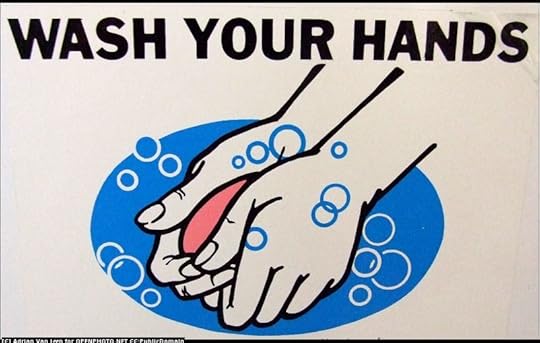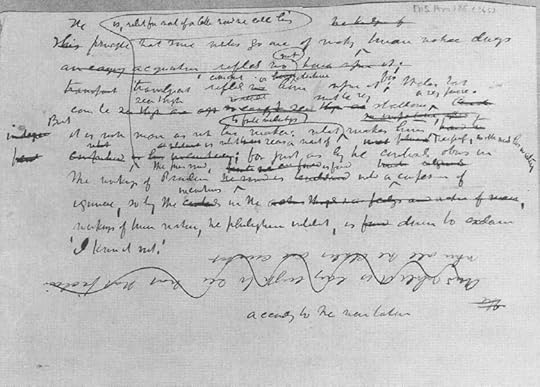Gary Neal Hansen's Blog, page 30
September 6, 2018
Letters to a Young Pastor: Choosing a Field Education Placement (part 2)

 CC by nonsequiturlass-SA 2.0
CC by nonsequiturlass-SA 2.0Dear ______:
Okay, glad to hear that you are closing in on a Field Education position for the coming term. I promised to write again with a couple further thoughts, so here you go.
Choosing a field education position, take two
Last time I recommended making sure you serve in both a large church and a small church.
I have three things to look for in whatever size of church you are looking at.
1. Look for a healthy church
First of all you should aim to do your field education in healthy churches.
Once a denominational executive told me, adamantly, that there is no such thing as a healthy church.
I thought he was absolutely wrong. I had already been part of a church that seemed to bubble over with vitality, as expressed in lives growing in discipleship and wholeness, networks of supportive and encouraging small groups, and involvement in mission and service — plus associate pastors who stayed on for decades rather than fleeing in brokenness.
The true bit in what he said is that there is no such thing as a perfectly healthy church, just as there are no perfectly healthy people.
Every church member is a sinner in need of forgiveness.
Each of us is a broken soul needing restoration in the image of God.
And every human organization has its share of dysfunctional people and processes.
Still, if you are choosing between two possible congregations for an internship, choose the one that shows more signs of flourishing.
Are there happy people? Or do you quickly encounter bitterness and rancor?
Do they have joy in worship? Or is Sunday morning a dour routine?
Do the people seem to want to learn and serve? Or are they aiming to maintain their individual and corporate status quo?
Why?
Because you are learning how to be a pastor, and that is complicated enough without the uphill battle of a troubled congregation.
And because your first experiences as a pastor are formative. You will be absorbing a sense of what is possible.
If you come to assume that bitterness, boredom, and self-interest are the typical way Christians and churches are, you may come to expect the same, and unconsciously even encourage it in your next position.
One of the most important things you can have before entering full time pastoral ministry is a rich set of experience of health in churches.
2. Look for a teaching church
You also need to look for a church that is eager to teach you. They should know that their field ed intern is a student pastor. Their job is to help you learn and grow in the role.
You will find far too many potential field education positions where the congregation simply wants to offload some of the work of ministry. The most typical scenario is that they want you to run their youth program.
They may have some youth, but nobody in the congregation has stepped up to be the youth leader. Easy answer? A field education student.
They may have a whole bunch of youth. They really want to call an associate pastor for that ministry, but they don’t have the financial strength to pull that off. They may think of a field education student as the cheaper option.
They may not have any youth at all, but they think that the fresh face of a seminarian will mystically conjure up a youth group, thus providing the members some hope for the future.
Being a field education student is not just filling a role. It isn’t doing a job. It isn’t fee for service. It is part of your spiritual formation as a pastor.
I don’t mean to discourage you from youth positions or other specialties.
Just make sure that, whatever the position, the church is going to provide the support and guidance you need to learn and succeed. The ideal, really, is that they don’t actually need you at all. They take you on to help you.
3. Look for a good supervisor
That support and guidance should come at least in part from the pastor. (And if you take a position as a solo student pastor, the guidance should come from whatever experienced minister in the area is serving as your supervisor.)
Ideally you should work under someone whom you can see as a potential mentor, during your field education service and beyond.
At the very least, you should look for a supervisor you respect, and who seems to know something about guiding a church toward health.
I say this because one of the most corrosive things in ministry is working under a problematic pastor
whom you distrust,
or whom you don’t respect,
or whose own ministry exacerbates problems in the congregation.
You won’t find a perfectly healthy church, and you won’t find a perfectly wise supervisor. But in your search for a really helpful position, always choose the healthiest option.
That’s good advice for other kinds of relationships too, by the way.
Blessings,
Gary
++++++++++++
Coming soon… my fall class to jump start your prayer life, “Pray Like a Reformer”!
I’d love to send all my “Letters to a Young Pastor” (along with my other new articles and announcement) straight to your inbox. Just scroll down to the black box with the orange button and sign up for my weekly(ish) newsletter!
The post Letters to a Young Pastor: Choosing a Field Education Placement (part 2) appeared first on Gary Neal Hansen.
September 3, 2018
Monday Meditation: RCL Year B, 23rd Sunday in Ordinary Time, Mark 7:24-37

 Holy Land, 1899, via British Museum
Holy Land, 1899, via British MuseumIn the lectionary Gospel reading for the 23rd Sunday of Ordinary time (Mark 7:24-37), we have two very different healing stories. What unites them is that they both happen as Jesus and his friends are on the same travel itinerary through Tyre, Sidon, and the Decapolis.
Mysteries in Mark 7:24-37
There are a number of things I find intriguing in this passage. There are mysteries here, if you will, of very different kinds.
Mystery 1: Jesus doesn’t explain his travel plans
It is a strange itinerary. Tyre is on the Mediterranean coast, north of Galilee. So it is no surprise he met a Syrophoenecian woman there — maps intending to portray the first century landscape show it to be in the province of “Phoenecia” or “Phoenecia Syria.”
Mark notes his route from there was
by way of Sidon towards the Sea of Galilee, in the region of the Decapolis” (Mark 7:31 NRSV)
But that is weird: Sidon is further North on the coast, while Galilee is to Tyre’s Southeast, with the Decapolis on the far Eastern side of the lake. That route meant miles and river crossings in the wrong direction.
So Jesus is doing the grand tour, without any explanation by Mark of what he was doing.
I’d say that’s the real mystery here. Why was Jesus there? What was Jesus thinking? It looks like he was reaching out to the Gentiles, spending time in their territories on the sly. But that sort of adds to the other mysteries in the passage.
Mystery 2: Jesus tried hard to fly under the radar.
In verses 24 and 36 Jesus makes a point of trying to stay out of the public eye — which seems odd if he was in Tyre and the Decapolis to reach the Gentiles.
When he went to Tyre, he actually tried to hide in someone’s house.
Then in the Decapolis, after healing the man who could neither hear nor speak, he told him not to tell anybody about it.
You’ll find scholarly discussions of this kind of thing under the category “The Messianic Secret”: Jesus, in Mark, made a big secret of his identity as the Messiah. It isn’t my field, but two fairly straightforward motivations explain at least most of the relevant passages.
(A) In some passages (not this one) he’s trying to keep the demons from praising him as Messiah.
That’s like back in Middle School, when you didn’t want attention from the uncool kids.
Or if you get hauled into court you don’t want a convicted criminal to testify to your character.
Jesus wants believable witnesses and he doesn’t need bad press. Everybody knows the demons are trouble, so it’s best to keep them quiet.
(B) In many passages (this one included), he’s trying to avoid getting worked to a nubbin by the demands of the crowd.
Every time he goes someplace there is a crowd of people who rush ahead to wait for him. He heals “all their diseases” but they just never stop. So sometimes he asks people, begs them, not to tell what he has done for them.
This is like being that woman who won the Lotto and wanted to stay anonymous.
Sure, she wanted to do generous things for some people. But she definitely didn’t want the word to get out. Even if she did nothing to help anybody with the money, she was going to have a lot of random calls, emails, and visits from long lost friends and relatives hoping for a hand out.
Jesus plays down his identity and his gifts so that he doesn’t get trampled to death by a needy crowd.
Mystery 3: Jesus was kind of rude to a woman in Tyre
But here, outside of Gentile territory, maybe another explanation is worth considering: Jesus didn’t come, first of all, to be their Messiah. He was the Messiah promised to the Jews. Later, with that work done, the Good News would be that he is the savior of all.
He’s not there to gain followers. He’s just scoping out the territory.
That seems to be Jesus’ reasoning when he replies to the Syrophoenecian woman. In Tyre, a local woman hears rumors of Jesus’ healing ability. She seeks him out asking for help. Jesus puts her off, comparing her to a dog begging for the children’s food.
Yikes! That’s just rude.
Now before we think this is totally out of character, remember that Jesus called other people names from time to time. The Pharisees, for instance, were “white-washed tombs” (Matt. 23:27).
Maybe what we need to do is revise our preconceptions about what Jesus is like. If you really comb the Gospels, you can find all kinds of times where Jesus did not seem to strive for niceness. He strove to be clear and honest, on the way to loving people into the kingdom.
But what does the insult mean? He’s saying he came to Israel, not to the Gentiles.
The story takes a surprising turn though: As they say,
…but she persisted.”
The woman takes Jesus’ rebuff and turn it into an argument for him to help her anyway:
Sir, even the dogs under the table eat the children’s crumbs.” (Mark 7:28 NRSV)
And Jesus LOVES it!
I picture a big grin sneaking onto his face, and a twinkle in his eye.
For saying that, you may go—the demon has left your daughter.” (Mark 7:29 NRSV)
It is definitely hard to understand Jesus’ rudeness.
And this is certainly not what I’ll recommend to my kids when I suggest they imitate Jesus.
But it helps me to think of the emotions that make sense of the dialogue.
Scripture is almost always very lean in its story telling. It is often more like an outline to a story, notes to the preacher, who will tell the story in a fuller way.
Mystery 4: Jesus heals a deaf man
There is a fourth, more modern mystery as well. In the second story Jesus heals a man who cannot hear or speak.
Surely in New Testament times this would be unquestionably wonderful. In our times it is not so clear cut.
Today, since the rise of American Sign Language, the Deaf community is a culture of its own.
Even if the Deaf do not hear words with their ears or speak words with their mouths, they have a language.
And they have a vast amount in common with each other.
Deafness creates many shared struggles and much shared experience.
And Deafness created the language with which the members of the community share those experiences and support each other.
There are Deaf social clubs and Deaf churches (though not everywhere by any means).
Here’s the thing: If Jesus were to come to a Deaf person today and offer to give them hearing, they might not take it.
They might hold back because to lose their Deafness would estrange them from their community — even from their church.
That often doesn’t make sense to a hearing person.
But if you know a Deaf person, someone whose primary communication is in American Sign Language, ask them: would they want to be healed of their inability to hear? Would this be “healing” or “crippling”?
This modern situation is worth pondering. What needs healing from Jesus depends on who you are, where you are, when you are.
I suspect if we are to be Jesus’ hands and feet, doing Jesus’ will in the world, we will need to think hard — and maybe listen hard — for what people want to be healed.
++++++++++++
My Monday Meditations are my personal explorations of the Gospel text assigned for the coming Sunday in the Revised Common Lectionary. I don’t claim to reach the bottom of the text, or to have the final word. But I offer them to you, whether for devotional reflection or to spark thoughts in your sermon preparation.
I’d love to send my Monday Meditations (as well as my other new articles and announcements) via email. Just scroll down to the black box with the orange button to subscribe to my weekly(ish) newsletter.
The post Monday Meditation: RCL Year B, 23rd Sunday in Ordinary Time, Mark 7:24-37 appeared first on Gary Neal Hansen.
August 30, 2018
Letters to a Young Pastor: Choosing a Field Education Placement

 Brick Presbyterian Church (Public Domain)
Brick Presbyterian Church (Public Domain)Dear ______:
I’m glad that you have reached the point in your seminary education that you are having to think about field education. I don’t know what your seminary requires, but hopefully you will have to do at least two placements.
Why two?
Because your education will be more complete if you can see and practice ministry within two very different kinds of churches. When you face the much more complicated process of taking up a pastoral position after seminary you will know at least a little bit by experience about the different possibilities.
(Even if you are thinking that you’ll serve in a non-parish ministry after seminary I strongly recommend that you take at least one placement in an ordinary congregation. Non-parish ministries need close ties to ordinary congregations, and you will need to know how they operate.)
Here are two things to look for — I can write about things to avoid another time if you want.
1. Do field education in a small congregation
First, you really should seek out a position in a small congregation.
What?” you say, “I don’t know anything about small congregations! All my background is in big churches.”
You are in a common situations. I don’t know the statistics, but a whole lot of the people who find themselves called to ministry come from big churches.
I joined a megachurch, University Presbyterian Church in Seattle, when I was a student at the University of Washington. When I headed off to seminary, I thought all Presbyterian churches were like UPC — and that turned out to be flat-out wrong. Most Presbyterian churches are actually quite small.
It is much more typical for a church to have a hundred members on the rolls than to have a thousand.
Getting experience in a church of typical size is really important.
On the one hand, it will mean you have experience in the kind of congregation most likely to be looking for a pastor when you graduate.
On the other hand, it will open your eyes to the kind of cells that have made up the Body of Christ for the last two thousand years.
For a church to be small does not mean it is failing. It just means that it is ordinary. Small churches are powerful: they provide worship, fellowship, and community to millions of Christians around the world.
And they are tenacious. Even in the most dire times, battered and bruised from within or without, they will still be there as outposts of God’s kingdom.
You should see that from the inside while you are in seminary so that you know what is possible.
Here’s a joke for you: What do they call someone who knows how to help a small church thrive and fulfill its part of Christ’s mission?
Answer: “Pastor.”
2. Do field education in a large congregation
The other thing you need to do if you can is find an opportunity to do field education in a large congregation — the larger the better.
Why? Because really amazing things happen in large congregations.
When I started seminary I was told that my church had more students at Princeton Seminary than any other single church — and we had more students at Fuller Seminary than any other single church. That’s a lot of ferment from one ministry of one large church.
Of course you’ll find some from small church backgrounds are pretty skeptical of what happens in megachurches.
And some big churches, perhaps many, lose as many out the back door as come into membership through the front door.
But I’ve known quite a few that have large numbers of members because they do such a good job of
teaching the faith,
building supportive community through small groups,
and getting their members into service in the world around them.
In short, many large churches are doing a great job of fulfilling their part of Christ’s mission.
They can do creative things because their large numbers bring together great resources.
You should see that from the inside while you are in seminary so that you know what is possible.
So use your field education opportunities to know the range of possibilities. Look for a couple very different churches to serve and you’ll benefit for the long haul.
Blessings,
Gary
++++++++++++
I’d love to send you all my “Letters to a Young Pastor” — along with my other new articles and announcements. Just scroll down to the black box with the orange button to subscribe, and they will arrive in my weekly(ish) email newsletter.
The post Letters to a Young Pastor: Choosing a Field Education Placement appeared first on Gary Neal Hansen.
August 27, 2018
Monday Meditation: RCL Year B, 22nd Sunday in Ordinary Time, Mark 7:1-8, 14-15, 21-23


We are back in Mark, continuing where we left off before our five week sojourn in John on the Bread of Life. As is so often the case, the Revised Common Lectionary leaves out some bits of the passage so it looks like three short readings (Mark 7:1-8, 14-15, 21-23).
Maybe it was because they didn’t want us to see Jesus getting testy with the Pharisees and scribes (7:9-13), or to hear him talking about pooping (7:17-20).
Or maybe they wanted to make sure the passage read in worship didn’t seem to go off on tangents.
Mark 7:1-8, 14-15, 21-23
So what is going on here?
Jesus and his followers meet up with some Pharisees and scribes from Jerusalem. Three things happen:
The Pharisees and scribes complain because some of the disciples don’t wash their hands before they eat.
Jesus turns it around and complains that the Pharisees and scribes put too much emphasis on human traditions and neglect the bigger parts of God’s law.
Jesus draws a big distinction between what does and doesn’t “defile” a person: Stuff from outside doesn’t defile us. Only stuff coming from inside us defiles us.
1. Confrontation on Hand Washing
I have little to say about the initial confrontation scene. The Pharisees and the Scribes thought it was maybe kind of gross that Jesus’ followers didn’t wash their hands before eating.
Mark explains, to a community who apparently did not know of such things, that the Jews not only washed their hands regularly but also their dishes and their pots and pans. These practices Mark calls “the tradition of the elders” (7:3), something so terribly misguided that the Pharisees and scribes would toss it in Jesus’ face (7:5).
Frankly I have this confrontation regularly with my kids. Fortunately they have not given me the argument that they are just being like the early Christians.
2. Jesus’ Emphasis on Law over Tradition
Even if basic hygiene and food safety were on the Pharisee’s side, Jesus makes it a teaching moment. The Pharisees and scribes, Jesus says, emphasize human tradition to the neglect of weightier matters of biblical law.
This is where the part of the text omitted by the lectionary could help us out: Jesus is saying that an overemphasis on human traditions, religious and ceremonial traditions in particular, can lead people to forget such important items as honoring their parents.
What he says implies other parts of the law too: like caring for the poor, the widow, the alien. But the point is clear: we are supposed to pay close attention to what God has already said is important. Like in the Ten Commandments.
It is a moment worth pausing on, if only because much of the Christian world has misconstrued it, at least in recent times.
By Jesus’ reasoning, human traditions can be weighed lightly, while the laws of God need to be taken very seriously.
It often appears we think he meant that human tradition can be jettisoned completely and the laws of God can often be jettisoned completely as well.
Am I just getting snarky here?
I don’t think so.
In many corners of my Protestant world, almost anything that is judged to be “human tradition” can be rejected. We’ve been doing this for centuries.
(The exception, of course, is the local traditions that we find personally meaningful. Heaven help the pastor who decides not to end the Christmas Eve service with everyone holding a lit candle and singing Silent Night.)
3. The Things That Truly Defile Us
The point Jesus really wants to get across, though, is that there really are some things that can defile a person. It isn’t about religious ritual, and it isn’t about personal hygiene.
Defilement comes from immoral and unethical behavior.
Perhaps more evocatively, defilement comes from our inner states, our attitudes and thoughts, that lead to that behavior.
Here’s Jesus’ list of things that defile:
…fornication,
theft,
murder,
adultery,
avarice,
wickedness,
deceit,
licentiousness,
envy,
slander,
pride,
folly.” (Mark 7:21-22)
It’s the kind of moral list making that I associate more with Paul than with Jesus.
But the interesting thing is thinking about the kinds of items these are.
Some come straight from the Ten Commandments.
Some foreshadow Christian thinking of centuries to come.
Thinking of centuries to come? Glad you asked.
In the fourth century Evagrius of Pontus, one of the most thoughtful of the Desert Fathers, created lists of the “Eight Thoughts.” These were the habits of mind that led to bad behavior .
In the West in the following centuries these were made more behavioral with the “Seven Deadly Sins.”
I think Evagrius must have been thinking of this passage of Mark. He was convinced that our inner state mattered — that we need to find ways to master the wayward tendencies of our thinking.
If we don’t discipline our thoughts, our greedy, prideful, lustful thoughts will lead us to all kinds of really defiling actions.
Inner Discipline for Outward Living
Ah, yes. Discipline. Living a truly Christian life will start with discipline within, learning to think truly — in tune with the love and mercy and purity of Jesus who is the Truth.
When good things are going on inside us, then good things will happen through us, outside of us. Then we won’t need to feel our actions are defiling us.
But really, washing your hands before eating is still a good idea.
++++++++++++
My Monday Meditations are a personal exploration of the Gospel text assigned in the Revised Common Lectionary for the coming Sunday. I hope you enjoy them, whether as a devotional reading or as a conversation partner as you prepare a sermon.
I’d love to send these, and all my new articles and announcements, straight to you by email. Just scroll down to the black box with the orange button and we’ll make it happen.
The post Monday Meditation: RCL Year B, 22nd Sunday in Ordinary Time, Mark 7:1-8, 14-15, 21-23 appeared first on Gary Neal Hansen.
August 21, 2018
Monday Meditation: RCL Year B, 21st Sunday in Ordinary Time, John 6:56-69

 CC by Alpha Stock Images-SA 3.0
CC by Alpha Stock Images-SA 3.0Since Jesus was God in the flesh, he must have been able to see into the future — right? But can we reasonably think that in this week’s lectionary Gospel he was gazing forward into 21st century American Christianity and trying to tweak every branch of the Church simultaneously?
I know: That’s a bit absurd.
Maybe he wasn’t actively trying to tweak four different parts of his Body, the Church, two millennia after he walked the earth. But it is my considered opinion that he did so effectively.
Or perhaps I just think in terms of historical theology.
John 6:56-69
The text is the fifth and final week of the Revised Common Lectionary’s Summer sojourn through the “Bread of Life” discussion in John 6. In particular we are dealing with John 6:56-69. (Of course they left off the last couple verses of the passage, since Jesus gets a bit negative about Judas there.)
1. Jesus Tweaks the Protestants in General.
The emphasis on Jesus as Bread of Life, all through the chapter, and here in 6:56-58, has had a way of seeming contrary to Protestant sensibilities.
We Protestants are all about hearing the Word, studying the Scriptures, encountering Jesus on the page and with our intellect —
And here he goes again, saying the thing we have to do is eat his Body and drink his Blood.
That is, it’s all about the Eucharist. Our once-a-quarter or once-a-month communion service looks pretty inadequate. So do our cavalier ways of substituting grape juice for wine, pre-slicing the bread in little cubes, and generally making it up as we go along.
In many Protestant circles the Eucharist is frankly optional.
For Jesus, clearly the Eucharist is quite necessary.
Doesn’t that just get your goat? Don’t you find yourself making exegetical arguments to say it can’t really mean that?
2. Jesus Tweaks the Post-Enlightenment Liberals in Particular.
When the disciples (good Protestants all, I’m sure) objected to all this (John 6:60), Jesus basically said
You think this Eucharist stuff is tough? Wait till you see the Ascension!”
It may seem odd that Jesus is discussing the Eucharist many chapters before it was instituted at the Last Supper. It is odder still that he’s talking about his Ascension, which came weeks after his Resurrection, which came days after his Crucifixion, all of which came after the Last Supper.
Does this offend you? Then what if you were to see the Son of Man ascending to where he was before?” (John 6:61-62 NRSV)
It isn’t just odd in terms of the biblical timeline.
It is odd that he chose to prove his point by bringing up one of the miraculous biblical incidents of which the Enlightenment was so very critical.
It is the kind of thing classical Liberals wanted to take symbolically or metaphorically. They were happy to look for the message and meaning of the Ascension. It is just the actual Ascension they didn’t want to accept.
I mean really: can modern people in a scientific world take seriously a Jesus who lifts off from the ground and shoots into heaven?
Well, Jesus seems to want us to take his ascension very seriously indeed.
Doesn’t that just get your goat? Don’t you find yourself making exegetical arguments to say it can’t really mean that?
3. Jesus Tweaks the Catholics and the Orthodox for Good Measure.
But it isn’t just the Protestants who have something to be offended at in this story. Catholics and Orthodox too can find Jesus poking them with the divine stick.
The Catholics and the Orthodox take the Eucharist very very seriously. Jesus’ real and miraculous presence in what starts the service as bread and wine are absolutely the Main Event on Sunday morning. They are all about eating his Body and drinking his Blood.
But Jesus seems to say here that what really matters is less tangible.
It is the spirit that gives life; the flesh is useless. The words that I have spoken to you are spirit and life.” (John 6:63 NRSV)
So, dear brothers and sisters, as the Protestants have been saying for half a millennium, it is spiritual stuff, not physical stuff that matters. It is really all about Jesus’ words, and believing him.
It’s about faith.
You can sort of see Jesus sadly shaking his head here.
But among you there are some who do not believe.” (John 6:64)
Or in modern vernacular,
Tsk, tsk, tsk.”
It’s all about believing.
Focus on matters of spirit, not of flesh.
Doesn’t that just get your goat? Don’t you find yourself making exegetical arguments to say it can’t really mean that?
4. Jesus Tweaks All the Non-Calvinists — of Course.
And finally, in a moment we Presbyterians find a bit vindicating, Jesus prods all the Non-Calvinists in the crowd.
When most of the band of disciples stopped following Jesus because of points 1-3 above, Jesus reminds the twelve, the faithful remnant, of what he said earlier in the chapter:
For this reason I have told you that no one can come to me unless it is granted by the Father.” (John 6:65 NRSV)
Most branches of Christianity emphasize something we do to at least cooperate with grace, if not to exercise a fully free will to choose the Way of Christ.
But Jesus says it’s really God’s doing. All your choosing and and repenting and self-discipline? You couldn’t have done it if God hadn’t granted you to Jesus.
As he put it earlier in the chapter,
No one can come to me unless drawn by the Father who sent me” (John 6:44)
Calvin called it “election” and “predestination.” (St. Augustine did too. So did St. Paul actually.)
Doesn’t that just get your goat? Don’t you find yourself making exegetical arguments to say it can’t really mean that?
An Equal Opportunity Offender
Now if you think I’m being sort of snarky or cynical thinking that Jesus would be so offensive to people who had set out to follow him, and maybe on purpose, I’ll just refer you to verse 60 and 66.
The disciples said Jesus’ whole line of teaching was difficult.
Many disciples stopped following him because of it.
Jesus was an equal opportunity offender. Over time, he gave people the truth — the whole truth. He pushed them to their personal limits.
That’s because he wanted only those whom his Father drew to him, to have them come to him with true and deep faith, to come to a miracle-working Christ, and to receive him truly and be utterly united to him for life by eating his Body and Blood.
++++++++++++
I’d love to send my Monday Meditations (along with my other new articles and announcements) straight to your inbox. Scroll down to the black box with the orange button to subscribe to my weekly(ish) newsletter, and all this will be yours…
The post Monday Meditation: RCL Year B, 21st Sunday in Ordinary Time, John 6:56-69 appeared first on Gary Neal Hansen.
August 15, 2018
Monday Meditation: RCL Year B, 20th Sunday in Ordinary Time, John 6:51-58

 Naylor Vickers Bells, CC by Matt Brown 2.0
Naylor Vickers Bells, CC by Matt Brown 2.0This is the fourth of five weeks that the Revised Common Lectionary spends ringing the changes on John 6, where Jesus proclaims that he is the Bread of Life — though in this particular excerpt he sticks to saying he is
the living bread that came down from heaven.” (John 6:51 NRSV)
Ringing the Changes
The phrase “ring the changes” seems apt to me: it comes from the English tradition of ringing church bells in carefully calculated sequences or “changes,” each one including the full range of available bells in a varying pattern.
Here’s a simple made-up example for a church with five bells of different notes. Ring them in this order:
12345
13245
13425
13452
See how the pattern changes the placement of bell number two?
(To learn more than you need to know about the practice in a classic mystery novel, check out Dorothy L. Sayers’ The Nine Tailors, featuring Lord Peter Whimsey. Seriously. She’s awesome.)
So Jesus is “ringing the changes.” Here and elsewhere in the chapter Jesus seems to say the same group of things:
He is the bread of life.
He is the bread that came down from heaven.
This bread is his body.
Everyone needs to eat this bread.
Stuff like that.
The ideas stay the same but the arrangement keeps changing.
John 6:51-58
Unlike the tradition of ringing the changes on bells, however, in John 6:51-58 Jesus actually keeps sneaking new elements into the sequence.
Those additions are the promises Jesus is making about the Bread of Heaven.
And if you are influenced by such teachers as Luther and Calvin, you know that you should pay careful attention to Christ’s promises. Saving faith in Jesus amounts to trusting him — trusting that the promises he gives are true.
In John 6:51-58 the promises fall into three groups.
1. Eternal Life
In this particular passage the framing promise is eternal life.
It opens with the promise that anyone eating this bread
…will live for ever…” (John 6:51 & 58 NRSV)
In the middle there is the slightly different phrasing of the promise that one eating this bread will
…have eternal life, and I will raise them up on the last day…” (John 6:54 NRSV)
Then it closes with the same promise as at the beginning: Anyone eating this bread
…will live for ever…” (John 6:51 & 58 NRSV)
Because of this framing it seems to be the main promise — but the frame is artificial.
This is not really a passage unto itself, with that promise at the beginning at the end. John 6:51-58 is the lectionary’s nearly random slice of a too-long-for-one-Sunday-morning story.
It also sounds central because of the cultural weight of the afterlife in American Christianity.
Whether it is your personal issue or not, as a culture we are almost obsessed with the question of whether we are going to heaven or hell, to eternal life or to damnation. Whole evangelistic campaigns, whole denominations, rest on that question.
So we are prone to read this passage and glom onto that promise about everlasting life and let it sort of wash into what we see elsewhere in the passage. If that’s all we see, it’s probably all we will preach.
But if everlasting life is all we preach, we are going to see a lot of eyes glaze over.
That’s because for a lot of people the question feels irrelevant. Don’t believe me? Ask around. Ask some non-Christians. Tell them you aren’t going to try to pressure them into anything — you just want to know how important living forever is in their personal viewpoint. Let me know the results.
Neither the threat of damnation nor the promise of everlasting life are getting a lot of traction in evangelism these days.
Don’t get me wrong — it is an important enough question. There’s a lot of biblical material to explore on it. But I think it is worth noting that the offer of everlasting life is not the only thing Jesus is talking about here — or elsewhere.
2. Life Within You
So what else is Jesus promising in this passage? Take a look at verse 53:
Very truly, I tell you, unless you eat the flesh of the Son of Man and drink his blood, you have no life in you.” (John 6:53 NRSV)
That promise is not about life after death. That’s about life right now.
Jesus is working with the idea that you and I can be technically alive while somehow walking around without any “life” in us.
That’s worth meditating on.
What kind of being goes wandering around the neighborhood without any actual “life” inside?
 Zombie Infection Area, CC by Beau Giles 2.0
Zombie Infection Area, CC by Beau Giles 2.0You got it: Zombies.
The “undead.” They are a multi-million dollar industry in Hollywood, and have been for years. Zombies, people with no actual life in them, are among our primal fears.
We don’t want to meet them.
And honestly, when it comes to primal fears, meeting them isn’t the real problem.
We don’t want to BE them.
We are afraid, deep down inside, that maybe we ARE them.
So take it one step further: What is being symbolized in all these Zombie shows?
What do I fear becoming, if I fear being alive with no actual life in me?
I fear that my existence is meaningless.
I fear that my daily life is more like a walking death.
If this is a fear that dominates popular media, then Jesus’ promise has a place to land.
It comes into sharpest relief for people with addictions: they eventually hit bottom, realize that something deadly has taken over and they are out of control. They need life inside.
But it is also there waiting to be seen for those of us with ordinary middle class problems.
Like our obsession with our Facebook newsfeed. We look with pleasure or outrage at the latest comments on the latest news, or we look with envy at someone who’s life seems to be so glorious — and afterward we feel dead inside.
I’ll tell you, since I left my faculty position, I get far fewer emails — but I check my accounts many times a day. I go looking for the tiny emotional hit of seeing a message from someone I know, some opportunity, some offer — and afterward I feel dead inside.
Jesus offers, instead, that with him we will have life inside. Without him? Not so much.
I want that Bread of Life. I want to have life inside me.
Who wants to be a zombie?
3. Union With Christ
This second promise, of life within us instead of death, should prompt us to ask how to get it. That, I think, is what we find in the third promise.
Those who eat my flesh and drink my blood abide in me, and I in them.” (John 6:56 NRSV)
Aha! The practical point, the one that becomes easier to imagine, is that receiving Christ as Bread of Life, we find ourselves in what is called “union with Christ.”
He’s foreshadowing two things here.
First, he foreshadows John 15, where he says a lot more about “abiding” with him as “branches” in the “Vine.” But here, just in passing, he makes “abiding” the consequence of his being Bread of Life. We eat the bread — and then we are physically united to the bread.
The second thing he foreshadows is the Last Supper, where he gives us the Eucharist, the Bread and Wine which he says are his Body and Blood. By physically eating and drinking them, we are spiritually united to him.
Eat this Bread of Life, be united to Jesus, and then you really will have his life within you.
Or as Jesus put it,
…so whoever eats me will live because of me.” (John 6:57 NRSV)
That promise deserves a world of attention.
In my experience it is not so easy as just “Ask Jesus into your heart, then every day you feel his life bubbling up inside.”
Rather there are a thousand decisions a day to choose the Bread of Life.
I need to choose Jesus instead of the internet, or whatever else obsesses.
There are individual processes to nurture, like a rich and active prayer life where I feed by faith on Jesus as Bread.
There are corporate process too, like an active life in the Church where I can receive his Body and Blood in the Eucharist.
But day by day, minute by minute, I need to choose Jesus — in the words of the Book of Common Prayer, to “feed on him in my heart by faith.”
++++++++++++
I’d love to send my Monday Meditations, as well as my other new articles and announcements, straight to your inbox. Just scroll down to the black box with the orange button to subscribe to my weekly(ish) newsletter.
I’m planning to put together a new class on prayer this fall — a great way to renew your prayer life in a season we all think of as a time of fresh starts. Watch my blog for news (or subscribe and you’ll hear by email.
This post contains an affiliate link.
The post Monday Meditation: RCL Year B, 20th Sunday in Ordinary Time, John 6:51-58 appeared first on Gary Neal Hansen.
August 9, 2018
Letters to a Young Pastor: The Children’s Sermon — Why Prepare?

 Herman Melville, Confidence Man manuscript (public domain)
Herman Melville, Confidence Man manuscript (public domain)Dear ______:
Thanks for your note. Yes, I do often say things like
When you are done preparing your children’s sermon, look at what you have written.”
Actually I was wondering when you would notice. I’m not entirely surprised that you objected.
Why should I write out my children’s sermon?” you ask. “The kids are going to be bored to tears if I sit there and read it to them.”
I’ll set aside the point that children actually love to be read to. In fact you are right. The children’s sermon is not something to read to them.
But your children’s sermon will be much better if you write it out in full.
Why Prepare Your Children’s Sermon?
I could make the argument of simple equity or respect for the task. You’ve learned to do serious preparation for your sermon to grown-ups, whose world you know personally. How does presenting the faith to children, whose world is a deeply foreign territory, require less of you?
In your preaching class in seminary you were taught to write out your manuscript in full. You had to show your professor that you were doing good exegesis, framing it in sound theology, and speaking it with the heart of a pastor in words that communicated powerfully to real people.
On the one hand, if you didn’t have it in writing, the professor couldn’t mark it and grade it.
But on the other hand, writing it out clarified your thinking. Once you’d written it all out, even if you preached from note cards or from memory, you had good words waiting inside your head when you had to stand up in front of the congregation and preach.
But still, the children’s sermon? As you put it,
I count on my preparation of the main sermon to back me up. When it’s time for the children’s sermon I just sit down and chat with the kids. I suppose you could say I wing it — and I think most preachers do the same.”
And I suspect you are correct.
Here’s a little secret: That is one key reasons so many children’s sermons fail.
Success by what criteria?
Fail?” you say. “How can you say my children’s sermon failed when after the service people came up and said it was great?”
Well, the people who said it was great were grown ups. They don’t count.
Sure, if your children’s sermon has one straightforward point about your text some adults will say
You know, pastor, that children’t sermon was the one thing I actually understood.”
But it is the kids who are the measure of your success.
Of course kids never come up to thank you for your children’s sermon.
The question is whether the kids get your children’s sermon. That’s where lack of preparation takes its toll.
The challenge of communicating with children.
Most people are afraid of any public speaking. Maybe they’ve had the experience of trying to give a speech, or even just talking in class with everyone’s eyes on them, and getting all tongue tied.
Why prepare your children’s sermon? When you talk off the top of your head, those fears come back and anxiety goes up. Even if you don’t consciously feel anxious, your sentences start to ramble on.
If you are a grown up, you are used to listening to
sentences that go in circles,
or sentences that go on, and on, and on
or sentences that stop halfway through a thought,
or sentences that switch direction midstream.
When you are a kid you just lose the thread. You probably keep listening, maybe nodding amiably — you want to please the grown-up.
But if the kids lose the thread, because your sentences are long and convoluted, you aren’t really communicating the gospel.
I could say more about this, but that’s the main point: If you speak off the top of your head, the kids stand a very good chance of missing the point. Prepare instead.
Blessings,
Gary
++++++++++++
I’d love to send you all my “Letters to a Young Pastor.” Just scroll down to the black box with the orange button to subscribe to my newsletter and all my new articles and announcements will come to your inbox in my weekly(ish) newsletter.
The post Letters to a Young Pastor: The Children’s Sermon — Why Prepare? appeared first on Gary Neal Hansen.
August 8, 2018
Monday Meditation: RCL Year B, 19th Sunday in Ordinary Time, John 6:35, 41-51

 CC by Upupa4me-SA 2.0
CC by Upupa4me-SA 2.0This week’s lectionary Gospel text (John 6:35, 41-51) starts with the same verse we ended with last week. Then, oddly, it skips four verses before continuing the story.
It is the middle week of a five-week-long revel in John 6, as Jesus discusses, debates, and disputes about manna from heaven and himself as the “Bread of Life.” Most weeks the assigned text overlaps little bits of the previous week.
As with most of Jesus’ long speeches in John, this one has much to meditate upon.
And as with most of these speeches, the topic flips and flops like a fish on a dock.
John 6:35, 41-51
Here’s the bullet point outline of this week’s portion:
Jesus claims to be the bread of life.
(Then we skip a bit.)
The listeners complain about his claim to have come down from heaven (which was in the skipped bit), since they know his family.
Jesus notes that only those drawn to him by the Father are going to get it.
Jesus draws a big contrast between the old manna from heaven and himself.
Eating manna only fed people for a day.
Eating Jesus, the True Bread, leads to eternal life.
Jesus says that the True Bread given for the world is his own flesh.
These topics do not form a tidy outline, nor does the conversation flow in a clear logical sequence.
Some of the connections and transitions are fascinating.
Drawn to Jesus, Not Choosing Jesus
For instance, consider what flows from the people’s complaint about Jesus’ claim to have come down from heaven.
Jesus’ response is not about his neighborhood or his family, or even his claim to be the Bread of Life. Instead he focuses on the reason his opponents are not drawn to him in the first place.
No one can come to me unless drawn by the Father who sent me;” (John 6:44 NRSV)
It’s a text that gives clarity to assertions about predestination, as well as giving comfort to those whose evangelistic efforts fall flat.
Deciding about Jesus is not, strictly speaking, a matter of objective choice, or evaluation of evidence.
Those who come to Jesus come because God has chosen to draw them.
Those who don’t come to Jesus? Well, God must not be working that way in them.
Listening and Learning Really Matters
What I’ve never really focused on before is that Jesus takes the discussion a step further:
Everyone who has heard and learned from the Father comes to me.” (John 6:45 NRSV)
At a glance it might sound like another slap on the cheek for those who haven’t come. But it sounds more to me like an opening.
Maybe…
If someone is seeking God, seeking to listen and learn, then eventually they will get there.
Listening and learning from God will, whether they know it or not, be coming to the one who is the Bread of Life, the True Bread that has come down from heaven.
I say this because this scene between Jesus and his opponents was not the opponents’ last day. Their stories went on. They continued to listen. They continued to learn.
We make a mistake when we assume everyone knows enough today about Jesus. Knowledge of the Word to whom we listen, the Truth which we must learn, comes gradually.
Personally I suspect most of us substantially misunderstand Jesus for a very long time, even if we we accept him. Rejecting him too comes from misunderstanding.
And we never understand him fully. There is an infinite amount of God, so no finite person can rightly claim to know it all.
And Trusting Is What Really Counts
We must hear more and learn more from God, and while we do so we have a clear charge: trust.
“…whoever believes has eternal life. I am the bread of life.” (John 6:47-48 NRSV)
It is trusting, believing, that grows when we listen.
It is trusting, believing, that grows when we learn.
It is trusting, believing, that grows when we draw near.
So maybe… when we trust, when we believe, somehow we obtain the Bread of Life.
So How Do I Step Into Believing?
So where, O Lord, will we get this bread? I want to hear and learn. I believe it is you I need. Does it stay a metaphor or does it ever get at all concrete?
…the bread that I will give for the life of the world is my flesh.” (John 6:51 NRSV)
Jesus’ flesh is the “bread” of which he speaks.
Jesus’ flesh is given for the life of the world. And we know that this happened most concretely. He went to the cross, giving his life, his very body and blood, for the life of the world.
But before he went there he had a feast with his friends. He took bread, and blessed, and broke it, and gave it to them saying “This is my body, given for you.”
This conversation took place long before either the Last Supper or the Cross. But Jesus points us to both. His body is given for the life of the world. We receive it as bread.
My prayer for Christians this Sunday is that they will come to the Table. Come and receive the Bread of Life — receive Jesus.
In John 6:35 & 41-55 Jesus gave us a rich metaphor of the embrace of faith, coming to Jesus to listen, learn, and believe. We do it by eating the flesh he offers.
++++++++++++
My Monday (sic) Meditations are my own reflections on the coming Sunday’s Gospel text assigned in the Revised Common Lectionary. I don’t claim to have gotten to the bottom of these texts, or to have done the definitive exegesis. This is just where the text takes me. Thanks for coming along.
I’d love to send these Monday Meditations to you, along with my other new articles and announcements. Scroll down to the black box with the orange button and subscribe to my weekly(ish) newsletter and all this will be yours.
The post Monday Meditation: RCL Year B, 19th Sunday in Ordinary Time, John 6:35, 41-51 appeared first on Gary Neal Hansen.
August 2, 2018
Letters to a Young Pastor: The Children’s Sermon — Is it THIS text?

 Dear ______:
Dear ______:
You make a good observation when you say “Half the battle is done if the point you make to the kids is rooted in a biblical text.”
But at the risk of mixing my metaphors, any preacher who stops because half the battle is done will preach a sermon that is only half-baked.
Is it this text?
The point is not just to preach a biblical point — something rooted in some text between Genesis and Revelation.
The point is to make a clear, relevant point from this biblical text.
You need to take the congregation (little kids or the grown ups) deeper in their understanding and living of the text of the morning.
Knowing the message you preach connects with a bible text is a good thing. That helps you avoid the problem of preaching a frankly non-biblical false-gospel message, as I wrote about in another letter.
But to be their pastor, you need to tell them something true and helpful from the text you read in worship that morning.
The risk
Here’s what happens if you don’t try to do this: you just give them one of your four favorite messages every week.
Every one of us quietly constructs their own inner sense of the key parts of the Christian faith.
The building blocks of that construction project are usually biblical texts — words of Jesus or Paul, phrases from psalms, images from the prophets, whatever. Some quite consciously become our “life verses” and others, more subtly, shape our core assumptions.
Once we are really formed by those select passages, we tend to come back to them again and again. They are the center to which life’s gravity pulls our understanding.
So picture yourself sitting down to talk to the kids. You know it is your chance to teach them about the faith, but you didn’t really prep anything. What comes out of your mouth?
You got it: it’s either your life verse or one of the three or four texts that serve as the pillars of your own personal systematic theology.
That’s okay on occasion. But the point is not to transfer your three favorite texts to the kids.
The task is to give them the whole biblical faith, piece by piece — so you can then get out of the way. The Holy Spirit will help them figure out what their own life verse and key texts are.
Is it a sermon?
This goes to the key point I’m trying to make in all these many letters about children’s sermons: You need to really think of the children’s sermon as a sermon.
It is just as much a sermon as the longer, more formal talk you’ll give the grown ups later in the service. It is different only because it is for a different, distinct group of people.
I think many pastors neglect this. Some think it is only a cozy time to connect with the kids. I value that connection, absolutely. But the children’s sermon is more than that. It is your opportunity to communicate about the Christian faith with them.
You don’t give them every single thing they will ever need to know about the faith in one Children’s sermon. But then you don’t put everything about the faith in one sermon for the grown ups either.
What you do is give one true, relevant, and helpful bit of what they need to know from that day’s text in an age-appropriate format.
The How-To Part
The best way to make sure you are doing that is to make sure that the point you make is rooted in the biblical text you chose to read that morning.
Once you write out what you are going to say to the kids, set it aside for a few minutes. Then reread the Bible text for the morning. Read through your children’s sermon and ask, “Is it this text? Does what I’m saying help the kids understand this biblical passage?”
Start with the assumption that the kids are smart enough to understand, curious enough to want to know, and connected to God enough to be able to grow.
Then explain the text.
Blessings,
Gary
The post Letters to a Young Pastor: The Children’s Sermon — Is it THIS text? appeared first on Gary Neal Hansen.
July 31, 2018
Monday Meditation: RCL Year B, 18th Sunday in Ordinary Time, John John 6:24–35

 Prosphora. CC by АннаМариа-SA 4.0
Prosphora. CC by АннаМариа-SA 4.0This Sunday’s Gospel in the Revised Common Lectionary (Joh 6:24–35) continues where we left off in John. Well, actually it skips a couple verses, but then it continues the story.
John 6:24–35
Much like in Mark, the crowd figured out where Jesus’ disciples were going and headed to the same place. They were full of questions.
Question One
They find Jesus there.
Rabbi, when did you come here?
they ask. We know the answer because we read last week’s text: he walked there across the water during the night.
What we don’t know is why they asked. But that part’s made clear from the bits the RCL skipped: they knew Jesus was left behind when the disciples left. The crowd itself took the next batch of boats.
Jesus seems to be itchin’ for a fight: He accuses them of bad motives for asking. They should be seeking him because they saw his signs. Jesus says they are just coming because they had filled their stomachs with his miraculous bread.
Maybe a certain Savior hadn’t had his coffee.
But he turns it around, and tries to make it a teaching moment. Don’t work for ordinary bread, he says, but for the food that brings eternal life.
Really it is kind of a cryptic statement. What kind of food has the Gospel ever brought up that brings eternal life? They hadn’t said they were there for any bread at all, and now Jesus is turning it into a metaphor…
Clearly he’s trying to get to some particular topic, whether they want to get there or not.
If you’ve been listening closely to John’s telling of the story, he’s actually been hinting at this kind of thing for quite a while.
There was the Wedding at Cana where Jesus’ first “sign” was to turn water into wine. Not bread, of course, but an evocative image of life—and surely a eucharistic allusion of some kind.
And there was the Woman at the Well to whom Jesus promised living water, and that once he gave it the water would bubble up inside her “to eternal life.” Again it isn’t bread, and it does’t have that eucharistic connotation of wine, but it has the promise that what Jesus IS and what Jesus GIVES is to be consumed, and it leads to LIFE.
So now, after water and wine, Jesus is talking about some kind of bread leading to eternal life. It is a eucharistic allusion again — and if you don’t believe me, just keep reading the chapter.
Question Two
Then comes the second question:
What must we do to perform the works of God?
They are sort of on topic, though they moved from the bread Jesus gives to the actions they should be taking. Or maybe it was like one of those press conferences where reporters shout out unrelated questions for their own purposes.
In any case, Jesus answers, nudging the focus back to where he wants it:
This is the work of God, that you believe in him whom he has sent.
Such an excellent Protestant answer: Just have faith. Faith alone will have you on track, right in the center of God’s will.
Take it as intended and you start with faith and let the implications permeate your living.
Take it the wrong way and you think you really ought not bother with anything but believing — and you end up ignoring a great deal of what Scripture teaches about faithFUL living.
Question Three
Either way it is a weighty bit of advice, and it prompts the third and fourth questions from the crowd:
What sign are you going to give us then, so that we may see it and believe you? What work are you performing? …
I suppose this proves that Jesus was right in his first argumentative assertion: They really weren’t coming because they had seen his signs.
(Of course it seems to me that seeing 5000 fed with 5 loaves and 2 fish is a pretty amazing sign. But he didn’t ask me.)
So they want to know about his signs. Note that he does not bother to recite the list for them. Jesus’ signs just stand there, for those who have eyes to see.
But then then the crowd seems to remember how Jesus kept dropping clues (er, breadcrumbs?) about the thing he wanted to talk about: Bread that brings eternal life.
They think of the miracle bread they’ve known about all their lives:
Our ancestors ate the manna in the wilderness…
And Jesus gets maybe a little testy again:
…it was not Moses
who gave you
the bread from heaven,…
(Well, they hadn’t said anything about Moses giving it.)
…it is my Father
who gives you
the true bread from heaven.
The Bread of Life
Or is he just making a couple key distinctions for them in their search for both bread and eternal life?
It doesn’t come from Moses. It comes from God.
It isn’t about something in the past. It is now, in the present.
Those contrasts are what I find most evocative here.
The gift that matters is not something in human chain of past events.
The gift that matters is from God, and it comes right now.
There is a metaphor or two in there, something useful for me in my life of faith right now — now, when Jesus says the true bread of heaven comes.
It is so easy to look to the past and see it as better, freer, more full of life. After a few years pass, a period of past struggle is seen in light of its conclusion: Back then I ate manna in the wilderness. Wouldn’t it be great to be back there?
In the present moment it is the struggle that shows most vividly — goals not yet achieved, puzzles of work or parenting not yet solved.
Jesus says that the bread that was GIVEN is far less important than the bread God now GIVES.
No wonder the crowd finally got the point.
Sir, give us this bread always.
And then comes the bit of vintage John:
I am the bread of life.
Whoever comes to me
will never be hungry,
and whoever believes in me
will never be thirsty.
It is one of the great “I Am” sayings. Jesus himself is what God is giving right now.
Come, he says. He’ll satisfy the hunger.
Believe, he says. He’ll satisfy the thirst.
The lectionary is going to spend a good long season in the rest of this chapter of John. Don’t be surprised if it starts to sound like it’s all about the Eucharist…
++++++++++++
These Monday Meditations are my own exploration of the Gospel text assigned for the coming Sunday in the Revise Common Lectionary.
I’d love to send you all of these, as well as my other new articles and announcements. Scroll down to the black box with the orange button to subscribe to my weekly(ish)newsletter and you’ll get all these good things by email!
The post Monday Meditation: RCL Year B, 18th Sunday in Ordinary Time, John John 6:24–35 appeared first on Gary Neal Hansen.



